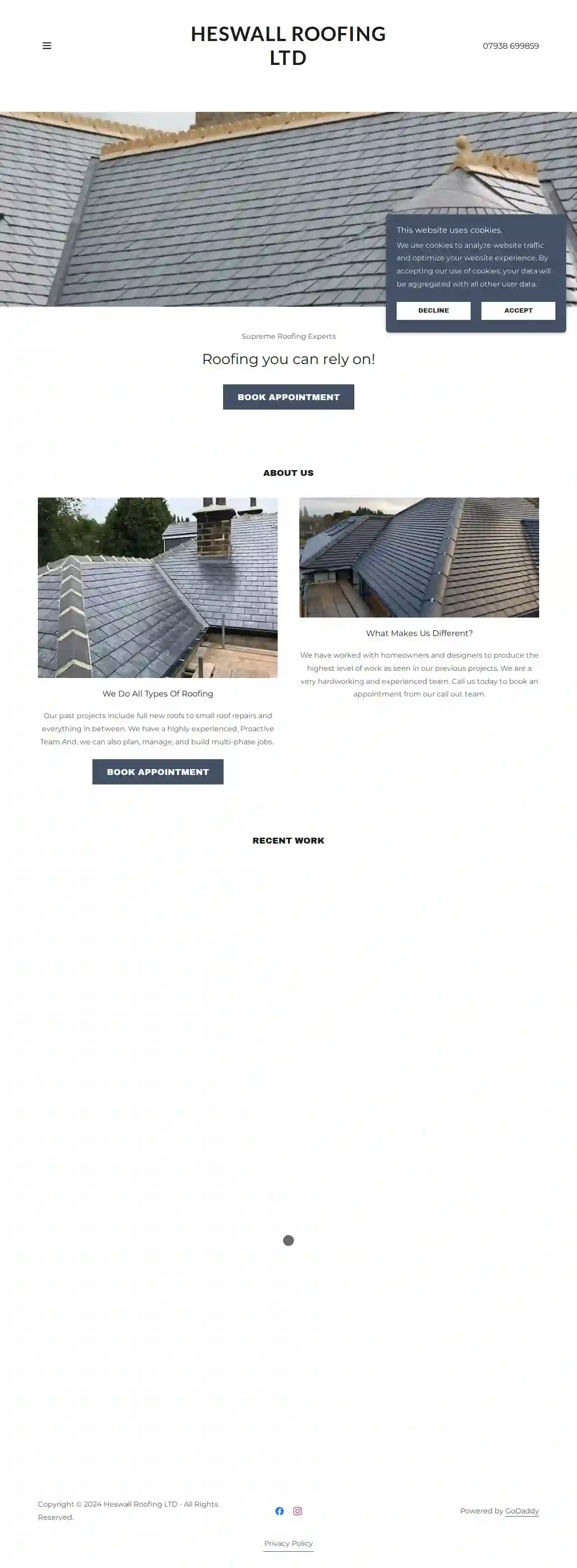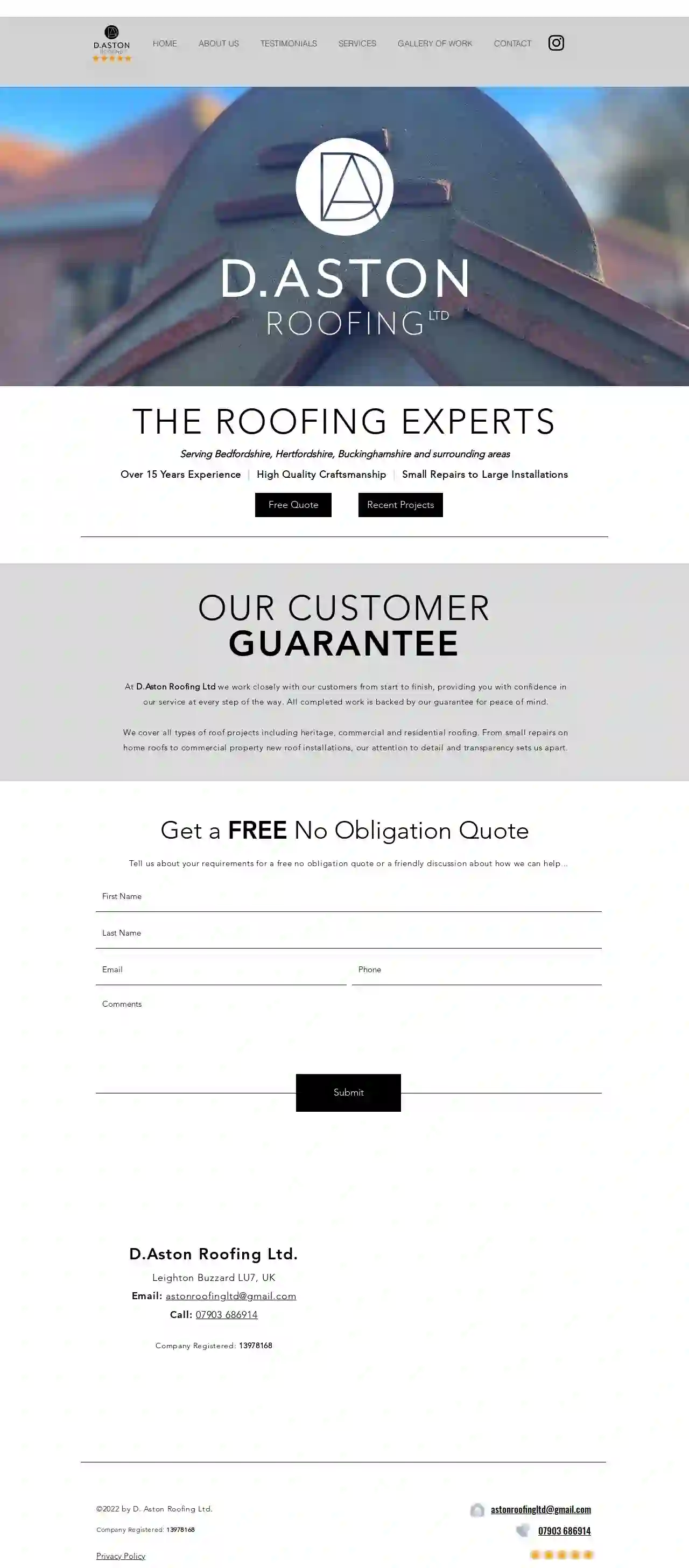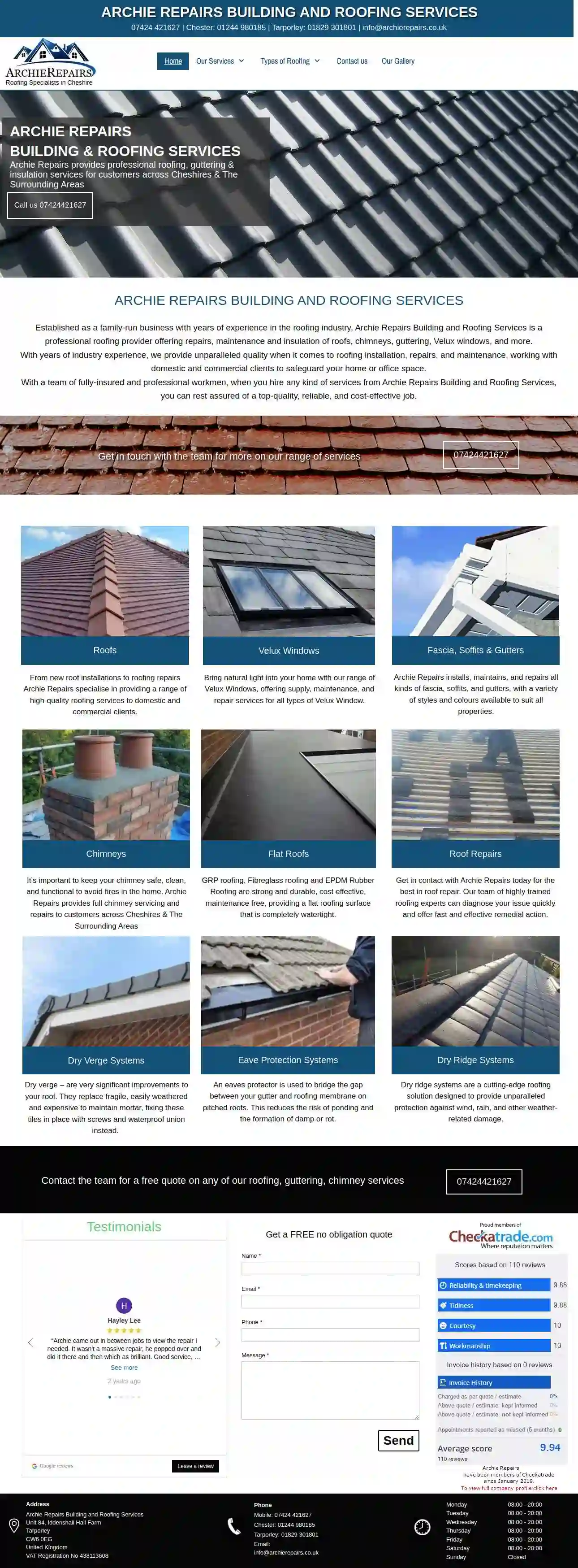Commercial Roofers Warrington
Find top Commercial Roofing in Warrington
Receive multiple Commercial Roofer quotes for your project today! Compare profiles, reviews, accreditations, portfolio, etc... and choose the best service.

Heswall Roofing Ltd
44 reviews256 Irby Road, Heswall, CH61 2XQ, GBSupreme Roofing Experts. Roofing you can rely on! We Do All Types Of Roofing Our past projects include full new roofs to small roof repairs and everything in between. We have a highly experienced, Proactive Team And, we can also plan, manage, and build multi-phase jobs. What Makes Us Different? We have worked with homeowners and designers to produce the highest level of work as seen in our previous projects. We are a very hardworking and experienced team. Call us today to book an appointment from our call out team.
- Services
- Why Us?
- Gallery
Get Quote
Roofline Roofing & Cladding Ltd
4.821 reviews293 The Chase, Benfleet, SS7 3DN, GBRoofline is a family-run business with decades of experience installing and repairing domestic roofs. Based in Benfleet, Essex, they pride themselves on their local reputation and commitment to high-quality workmanship. As time-served tradesmen, they offer free, no-obligation quotes with no hidden costs. Roofline ensures projects are completed on time, within budget, with minimal disruption, and to the exacting standards they are known for. They specialize in leak detection and prevention, and their team is dedicated to providing a professional, friendly, and reliable service.
- Services
- Why Us?
- Accreditations
- Our Team
- Testimonials
- Gallery
Get Quote
CM Roofing Wigan
52 reviewsUnit 1, 100-102, Wigan, WN1 1AA, GBC.M. Roofing Wigan is a family-run business with over 20 years of experience in the roofing industry. We pride ourselves on providing a high-quality, reliable service at competitive prices. We cover all aspects of roofing, from small repairs to complete roof replacements. Our team of experienced roofers is fully qualified and insured, and we are committed to providing our customers with the best possible service. We understand that your roof is one of the most important parts of your home, and we take our responsibility to protect it seriously. We use only the highest quality materials and workmanship, and we are always happy to answer any questions you may have about your roof. If you are looking for a reliable and experienced roofing company in Wigan, look no further than C.M. Roofing. We are confident that we can meet your needs and exceed your expectations.
- Services
- Why Us?
Get Quote
D Aston Roofing Ltd
532 reviewsLeighton Buzzard, LU7, GBD.Aston Roofing Ltd is a roofing company based in Leighton Buzzard, serving Bedfordshire, Hertfordshire, Buckinghamshire and surrounding areas. With over 15 years of experience, they pride themselves on high quality craftsmanship and attention to detail. They handle all types of roofing projects, from small repairs on residential homes to large-scale new roof installations for commercial properties. D.Aston Roofing Ltd. is committed to working closely with their customers, providing transparency and confidence throughout the entire process. All completed work is backed by their guarantee, giving customers peace of mind.
- Services
- Why Us?
- Gallery
Get Quote
Dp plastics and roofing Ltd
4.629 reviewsSelby, Great North Road, Leeds, LS25 5LQ, GBWelcome to D P Plastics & Roofing, a family-run business committed to providing top-quality roofing services in Leeds and surrounding areas. Our experienced team of roofers has a great deal of trade experience and deals with all aspects of domestic, commercial, and industrial roofing. We offer a range of services, including flat roofing, felt roofing, slate roofing, EPDM rubber roofing, and roof repairs. Our goal is to provide a quality-driven service that reflects excellent craftsmanship and cost-effective solutions, responsive to our clients' individual needs. Whether you're a homeowner or a business owner, we're here to help you with all your roofing needs.
- Services
- Why Us?
- Our Team
- Gallery
Get Quote
Archie Repairs Building and Roofing Services
4.930 reviewsUnit 84, Iddenshall Hall Farm, Tarporley, CW6 0EG, GBArchie Repairs Building and Roofing Services is a family-run business with years of experience in the roofing industry. We provide professional roofing, guttering & insulation services for customers across Cheshire and the surrounding areas. We offer a range of services including roof repairs, maintenance and insulation of roofs, chimneys, guttering, Velux windows, and more. Our team of fully-insured and professional workmen ensure a top-quality, reliable, and cost-effective job.
- Services
- Why Us?
- Our Team
- Testimonials
- Gallery
Get Quote
Middlewich Roofing
551 reviewsMiddlewich, Middlewich Road, CW10 9AA, GBWelcome to Middlewich Roofing, a Family Business From Three Generations of Roofers. From slipped tiles to repairing storm and wind damaged roofs, we’ve got you covered. Our small professional roofing team are fully qualified and highly skilled, and they can quickly assess your roof repair or replacement requirements and suggest the most suitable economical solutions. Exceptional Google reviews (view here). Zero obligation free quotes. Full insured and work is guaranteed. We obtain great prices on materials. Highly qualified and professional in-house team. Drone survey to quickly assess damage. Respectful of clients’ property and neighbours. Call us today on 01606 537305 or click here for a FREE quotation.
- Services
- Why Us?
- Accreditations
- Our Team
- Testimonials
- Gallery
Get Quote
J Jones roofing & guttering
52 reviewsAlsager, CW12, GBJ Jones Roofing & Guttering is a family-run business with over 25 years of experience in providing quality roofing and domestic building services in Alsager and throughout Cheshire and Staffordshire. We pride ourselves on our reliable and trusted service, offering 24-hour emergency call-outs and free roof inspections. Our team of experts can handle all aspects of roofing, from repairs and new installations to flat roofing, chimney work, and gutter cleaning. We also offer a range of domestic building services, including fencing, ground works, and the construction of porches, carports, and garden walls. We are fully insured and guarantee all our work. We understand that a leaking roof can be a stressful situation, which is why we offer a fast, efficient, and responsive repair service. We also know that choosing the right roofer is important, so we are committed to providing transparent pricing, clear communication, and exceptional customer service. Save our app to your phone for quick and easy access to our services whenever you need them. We're always here to help!
- Services
- Why Us?
- Accreditations
- Our Team
- Testimonials
- Gallery
Get Quote
Kershaw Roofing & Cladding
34 Parham Drive, Unit G Woodside Trade Centre, Eastleigh, SO50 4NU, GBKershaw Roofing Limited is a leading provider of roofing and cladding solutions for commercial, industrial, and residential clients. With a wealth of experience and a commitment to excellence, we offer a comprehensive range of services, including sheet roofing and cladding, rainscreen systems, pitched roofing, single-ply roofing, structural roof decking, living roofs and walls, cold-applied liquid roofing, solar PV, asbestos removal, industrial and commercial flooring, and safety systems. We pride ourselves on our ability to deliver high-quality workmanship, innovative solutions, and exceptional customer service. Our team of skilled professionals is dedicated to providing tailored solutions that meet the specific needs of each client. Whether you require a new roof installation, a refurbishment, or maintenance services, Kershaw Roofing is your trusted partner. We are committed to exceeding your expectations and ensuring your complete satisfaction.
- Services
- Why Us?
- Accreditations
- Our Team
- Testimonials
- Gallery
Get Quote
Cheshire Wide Roofing & Building Ltd
4.824 reviews29 The Downs, Altrincham, WA14 2QD, GBCheshire Wide Roofing & Building Ltd has been delivering and installing roofing and building work across Cheshire & South Manchester for over two decades. We have the experience to perform your job with a quick, and cost-effective service. We pride ourselves on being one of the leading choices for roof repairs in the area due to our dedication to providing the best services. Our clients value us like family and we strive to make our clients happy while producing the best work.
- Services
- Why Us?
- Our Team
- Testimonials
- Gallery
Get Quote
Over 12,314+ Roofing Contractors on our platform
Our roofing experts operate in Warrington and surrounding areas!
Roofyng.co.uk has curated and vetted Top Roofers arround Warrington. Find a top & reliable business today.
Commercial Roofing FAQs
- Assessment and Planning: The roofing contractor will assess your roof's condition, take measurements, discuss your needs and budget, and recommend a suitable roofing system.
- Permitting: The contractor will obtain the necessary permits from your local building department, ensuring compliance with building codes.
- Material Delivery: The roofing materials will be delivered to your site.
- Site Preparation: The contractor will prepare the work area, including setting up safety barriers, protecting surrounding property, and ensuring access for equipment.
- Removal of Existing Roof (if applicable): If replacing an existing roof, the old roofing materials will be carefully removed and disposed of properly.
- Roof Deck Preparation: The contractor will inspect and prepare the roof deck, making any necessary repairs or reinforcements to ensure a solid foundation for the new roof.
- Installation of Underlayment: A waterproof underlayment will be installed on the roof deck to provide an additional layer of protection against leaks.
- Installation of Roofing System: The new roofing system will be installed, following the manufacturer's specifications and local building codes.
- Flashing and Edging: Flashing will be installed around chimneys, vents, skylights, and other penetrations to prevent leaks. Edge metal will be installed along the roof's perimeter for a finished look and proper water drainage.
- Inspection and Cleanup: The contractor will conduct a thorough inspection of the completed roof to ensure proper installation and address any potential issues. They will then clean up the work area and remove any debris.
- Leaks
- Structural damage
- Premature roof deterioration
- Proper Design and Installation: Ensure your roof has a sufficient slope for proper drainage during the design and construction phase.
- Regular Inspections and Maintenance: Inspect the roof regularly for clogged drains or debris buildup.
- Repair Sagging Areas: Address any sagging or low spots on the roof, as they can trap water.
- Tapered Insulation: Consider installing a tapered insulation system to create a gradual slope toward the drains.
- Regular Inspections: Schedule regular roof inspections, ideally twice a year, to identify potential problems early.
- Timely Repairs: Address any damage or leaks promptly.
- Debris Removal: Keep the roof clear of leaves, branches, and debris.
- Gutter Cleaning: Clean gutters and downspouts regularly.
- Snow Removal: In snowy regions, remove snow buildup to prevent excess weight and ice dams.
- Preventative Maintenance: Consider a roof maintenance plan that includes regular inspections, cleaning, and minor repairs.
- Manufacturer's Warranty: Offered by the manufacturer of the roofing materials and typically covers defects in the materials themselves, such as premature failure, curling, or discoloration. The length of the warranty can vary depending on the material and manufacturer, ranging from a few years to a lifetime.
- Contractor's Warranty: Provided by the roofing contractor and covers the quality of the installation workmanship. This warranty typically covers leaks or other issues that arise due to improper installation and is usually for a shorter period, often 1 to 10 years.
- Extended Warranties: Options to extend the standard warranty period for an additional cost.
- Specific Warranties: Covering specific aspects of the roofing system, such as ponding water resistance or wind uplift resistance.
What is the process for a commercial roof installation?
How do I prevent ponding water on my commercial roof?
What are some tips for preventing roof damage on my commercial building?
What are the different types of roof warranties?
What is the process for a commercial roof installation?
- Assessment and Planning: The roofing contractor will assess your roof's condition, take measurements, discuss your needs and budget, and recommend a suitable roofing system.
- Permitting: The contractor will obtain the necessary permits from your local building department, ensuring compliance with building codes.
- Material Delivery: The roofing materials will be delivered to your site.
- Site Preparation: The contractor will prepare the work area, including setting up safety barriers, protecting surrounding property, and ensuring access for equipment.
- Removal of Existing Roof (if applicable): If replacing an existing roof, the old roofing materials will be carefully removed and disposed of properly.
- Roof Deck Preparation: The contractor will inspect and prepare the roof deck, making any necessary repairs or reinforcements to ensure a solid foundation for the new roof.
- Installation of Underlayment: A waterproof underlayment will be installed on the roof deck to provide an additional layer of protection against leaks.
- Installation of Roofing System: The new roofing system will be installed, following the manufacturer's specifications and local building codes.
- Flashing and Edging: Flashing will be installed around chimneys, vents, skylights, and other penetrations to prevent leaks. Edge metal will be installed along the roof's perimeter for a finished look and proper water drainage.
- Inspection and Cleanup: The contractor will conduct a thorough inspection of the completed roof to ensure proper installation and address any potential issues. They will then clean up the work area and remove any debris.
How do I prevent ponding water on my commercial roof?
- Leaks
- Structural damage
- Premature roof deterioration
- Proper Design and Installation: Ensure your roof has a sufficient slope for proper drainage during the design and construction phase.
- Regular Inspections and Maintenance: Inspect the roof regularly for clogged drains or debris buildup.
- Repair Sagging Areas: Address any sagging or low spots on the roof, as they can trap water.
- Tapered Insulation: Consider installing a tapered insulation system to create a gradual slope toward the drains.
What are some tips for preventing roof damage on my commercial building?
- Regular Inspections: Schedule regular roof inspections, ideally twice a year, to identify potential problems early.
- Timely Repairs: Address any damage or leaks promptly.
- Debris Removal: Keep the roof clear of leaves, branches, and debris.
- Gutter Cleaning: Clean gutters and downspouts regularly.
- Snow Removal: In snowy regions, remove snow buildup to prevent excess weight and ice dams.
- Preventative Maintenance: Consider a roof maintenance plan that includes regular inspections, cleaning, and minor repairs.
What are the different types of roof warranties?
- Manufacturer's Warranty: Offered by the manufacturer of the roofing materials and typically covers defects in the materials themselves, such as premature failure, curling, or discoloration. The length of the warranty can vary depending on the material and manufacturer, ranging from a few years to a lifetime.
- Contractor's Warranty: Provided by the roofing contractor and covers the quality of the installation workmanship. This warranty typically covers leaks or other issues that arise due to improper installation and is usually for a shorter period, often 1 to 10 years.
- Extended Warranties: Options to extend the standard warranty period for an additional cost.
- Specific Warranties: Covering specific aspects of the roofing system, such as ponding water resistance or wind uplift resistance.